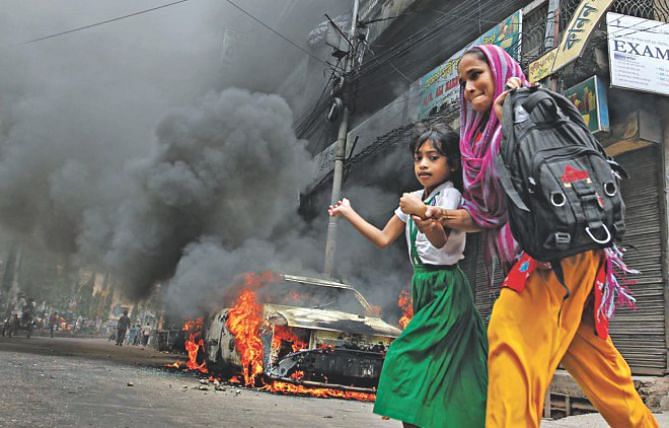Perpetuating VIOLENCE

If the current spate of violence has been unprecedented, and one that borders on militancy, then one must delve into why that is so and what has engendered violence, without for a moment intending to justify these acts.
AL should understand that, to quote an erudite scholar and researcher on violence in South Asia, “It's only when the politicised social groups fail to manoeuvre, negotiate and bargain within the political space that they resort to violence.” And what is happening today is the result of a political group being pushed to the wall, and I say this not as a justification of the violence we are seeing today but as a mere explanation of why it is happening, trying to link the causal factors to the violence we have been witnessing from the start of 2015. And those who fail to see a causal link between the on-going violence and the denial of political space would only be encouraging a situation to mutate from what is in its seminal stage of a conflict situation to full blown hostility. Terrorism or militant acts do not occur in the abstract. There are objective reasons why individuals or groups resort to militancy, and unless that is addressed no solution can have permanence.
The PM, while addressing an evaluation meeting with senior police officials on January 28 marking the Police Week 2015, made some very significant statements that deserve deliberation. To start with, she ordered the police to do whatever was needed to stop the violence perpetrated in the name of blockade. And equally significantly she stated, and one has no reason to differ with her: “What the BNP-Jamaat has been doing since January 5 in the name of hartal and blockade would never be recognised as a movement in the political history as these are terrorism and militant acts.” But what is most significant of all that she said was that she would take the responsibility for whatever happens (because of police actions to combat the violence).
These are significant statements in the sense that they are exhortations from the head of the executive branch to a force whose primary job it is to provide security to the people. And when does a prime minister need to take responsibility of the security forces for doing what their job is as defined by the book if they remain by the book? And this is where the fine distinguishing furrow separates the legal from the illegal, because, contrary to what some might say, enforcing law and order by the police does not mean taking law in their hands, which they have, particularly in the latter part of January when suddenly we noticed repetition of incidence of crossfire. Sometimes the victims had the bad luck of being run over by a truck while attempting to escape from police custody!
Surely the law-enforcement agencies are issued with arms not to play ha-du-du or dangguli. But a weapon that can kill must be used with extreme caution. The police are given arms not to kill people. These are given primarily to deter and for self defence.
It will serve no one's purpose to deny that a conflict situation prevails in the country. And what is going on the name of hartal and blockade are plain and simple terror acts. Given that the opposition is trying to coerce the government by inflicting violence on the people, and the government veering more towards tougher law and order measures that might not remain within the rules of the game, how will things evolve in the next few weeks or months?
Unfortunately for the people, there is no easy way out from the morass. That would require the two implacably mutually hostile political parties to climb down form their respective positions. Sadly, both parties are driven by hardliners who would not allow any thoughts of compromise. As the situation now stands, for the BNP to withdraw from their position, and call off hartal and oborodh without a firm commitment from the government of a dialogue would be courting political death.
For the government to cede to the BNP demands for discussions, in the face of BNP coercion applied through violence, would amount to capitulating to violence and thus a political defeat. And the government will not allow that to happen fearing the risk of being seen as a failure to provide security to the people. But that is the step that a responsible government must take, and that would earn them more political mileage than anything else. Failing that, the situation is likely to linger with the cycle of violence self perpetuating—violence by BNP followed by hardline of the government followed by more violence and…
It would be a folly to address the situation as a law and order issue only. Because even if the violence is curbed through whatever measures the government employs the underlying political issues would still need to be resolved.
The writer is Editor, Oped and Defence & Strategic Affairs, The Daily Star.

 For all latest news, follow The Daily Star's Google News channel.
For all latest news, follow The Daily Star's Google News channel. 



Comments